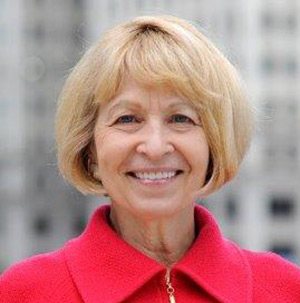Diana Aviv grew up in a predominantly white part of Africa that experienced the apartheid regime, children taken from their families, and systemic racism.
Now, as the former CEO of Feeding America, the Partnership for America Democracy, and Independent Sector, Aviv has a broad lens of why exactly America needs a fully-functioning democracy.
Aviv will give her lecture, titled “What Our Democracy Today Requires of its Citizens: An Inquiry into the Role of Everyday Citizens in Building the Next Democracy” at 2 p.m. Tuesday, July 26, in the Hall of Philosophy for Week Five of the Interfaith Lecture Series, themed “The Ethical Foundations of a Fully Functioning Democracy.”
“What we really need is a massive effort from people of goodwill across the United States to come together and make sure that we have a functioning, effective and strong democracy,” Aviv said. “If we fail to do it, the consequences are quite dire.”

Aviv emphasized that this is not an issue to toss aside, and said that tending to democracy is the most important thing all citizens have to face, because “our system is breaking; it’s failing.”
She wants people to recognize the severity of the downfall of democracy, and that it won’t resolve itself.
“What’s at stake is the whole future of American society,” said Aviv, who also previously served on the White House Council for Community Solutions
She wants her audience to go home and figure out ways to get involved in changes to protect American democracy.
Thoughout her career, Aviv has worked with domestic violence issues, the anti-apartheid movement and with people facing the dealth penalty.
When her father was 11, he and his family fled from Poland to South Africa to escape anti-Semitism before World War II broke out, but the cruelties were still there, just targeted at a different demographic.
“As a child growing up in South Africa, I saw the horrors of a system that treated some people, just on the basis of their skin color, in a completely different way than others,” Aviv said.
Witnessing this explicit racism, Aviv said she often had privileges or opportunities that someone who was the same as her, with a different skin color, was barred from having.
“I just thought it was wrong. I thought it was despicable for them. It’s not fair to them,” Aviv said. “It meant that whatever I got was because of the skin color — not because of my expertise or knowledge or talent or anything I did — because I was protected.”
When she was a child in South Africa, her family’s housekeeper had a 2-year-old daughter. Aviv said the law at the time dictated that if anyone had children in the towns they worked in, the children had to be sent to the homelands, which were separate areas the South African government created to carry out the forced removal of Black citizens from urban areas. The housekeeper’s daughter was taken from her mother and placed in the designated homeland.
“That child, up until age 2, was with us every day in the house, and suddenly their child wasn’t there anymore,” Aviv said. “I couldn’t even begin to imagine a society that rips a child from the mother, and then strips their child of any right to come back into the society because they’ve now been sent to one of these crazy homelands.”
Seeing this, and being a part of a youth organization, helped Aviv develop her passion for social justice, where she said she could work with other youth leaders to better understand these wrongdoings and how to fix them.
“What I learned was that when people could have a hatred for another, (they could) try and destroy them in their totality,” Aviv said. “That’s why the apartheid regime so resonated, because it had happened to my own people, or my father and his family.”
Aviv said knowing all of this history made her wary of governmental systems because of the “hierarchy of whiteness” and how it undermines the efforts to make sure these social injustices don’t happen again.
“Always, my life has been about making love fairer for others and creating more opportunity, so that everybody has a fair chance in life,” she said.




